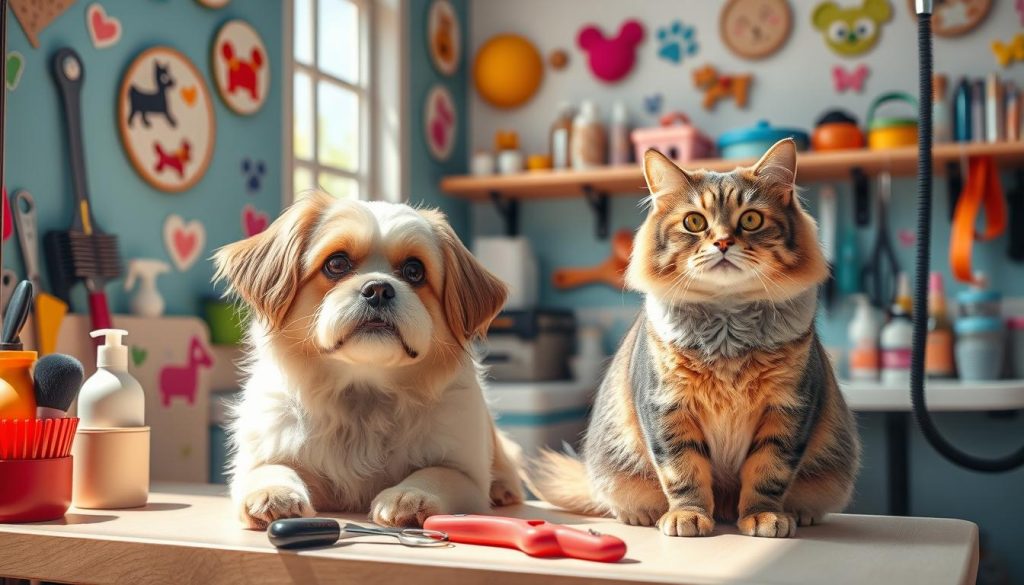Keeping your pet healthy is key to their happiness. In this guide, I’ll share tips and advice to help your pet stay well. This includes understanding their diet and recognizing illness signs. These strategies will help you care for your pet, no matter if they’re furry, feathered, or scaly.
As a pet owner, your main goal is to see your pet thrive. Learning about pet wellness will make your bond with them stronger. You’ll learn how to feed them right, keep them active, and create a calm space. This guide will give you the tools to improve your pet’s health and happiness.
Understanding Your Pet’s Nutritional Needs
Proper pet nutrition is key to your pet’s health and happiness. As a responsible pet owner, knowing what nutrients your pet needs is important. You should also know how to pick the best pet food ingredients.
By reading pet food labels and choosing the right diet, you can meet your pet’s needs. This depends on their age, breed, and how active they are.
Decoding Pet Food Labels
Going through the pet food aisle can be tough. But, understanding pet food labels makes it easier. Look for foods with real, whole ingredients like meat, poultry, or fish first.
Avoid foods with lots of artificial additives, preservatives, or fillers. Check the guaranteed analysis for protein, fat, and fiber levels.
Choosing the Right Diet for Your Furry Friend
When picking a pet food, think about your pet’s age, breed, and activity level. Puppies and kittens need food that helps them grow fast. Senior pets may need special food for their changing needs.
Active pets need more calories and protein. Less active or overweight pets might need less calories and more fiber. Talk to your vet to find the best nutrition and diet for your pet.
Understanding your pet’s nutritional needs and learning about pet food labels helps you make good choices. A balanced, high-quality pet food is essential for a happy, healthy pet.
Promoting Physical Activity and Exercise
It’s key to keep your pet active for their health. Fun playtime, outdoor fun, and brain games are great. They help prevent obesity and keep your pet’s heart healthy. This way, they can live a happy, full life.
To help your pet stay active, try these tips:
- Take your dog for daily walks or runs, adjusting the duration and intensity based on their age and fitness level.
- Set up an indoor play area with interactive toys, such as puzzle feeders or treat-dispensing balls, to encourage your pet to stay active.
- Engage your pet in regular playtime, including fetch, tug-of-war, and other games that get them moving.
- Enroll your pet in agility training or other enrichment classes to challenge their mind and body.
- Provide a variety of toys and activities to prevent boredom and keep your pet’s interest piqued.
Regular exercise is good for your pet’s body and mind. It helps prevent obesity and ensures a long, healthy life. By keeping your pet active, you strengthen your bond and help them stay happy.
| Benefits of Regular Pet Exercise | Examples of Pet Exercise Activities |
|---|---|
|
|
Make exercise a regular part of your pet’s life for their health and happiness. Start slow and watch how they do. Gradually add more to keep them safe and happy.
Pet wellness: Creating a Stress-Free Environment

It’s key to make your pet’s space calm and free from stress. Knowing what causes anxiety and making a peaceful area can make your pet feel safe and happy.
Identifying and Managing Anxiety Triggers
Pets get stressed for many reasons like loud noises or new people. It’s important to find out what scares them and take steps to lessen it.
- Loud Noises: Use calming music or white noise to block out loud sounds. Give your pet a cozy spot to hide.
- Changes in Routine: Keep a regular schedule for meals, play, and other activities. This makes your pet feel secure.
- Unfamiliar Environments: Let your pet get used to new places slowly. Let them explore at their own pace.
By knowing and dealing with these stressors, you can make a calm space for your pet. This is good for their mental and emotional health.
Enriching Your Pet’s Surroundings
Adding fun activities and things to see can also help. This is called pet environmental enrichment. It reduces pet stress and pet anxiety. It also helps with pet behavior and pet mental health.
| Enrichment Activity | Benefits |
|---|---|
| Hiding Treats | Encourages natural foraging behaviors and stimulates your pet’s sense of smell. |
| Puzzle Toys | Challenges your pet’s problem-solving skills and provides mental stimulation. |
| Rotating Toys | Introduces novel items and prevents boredom, keeping your pet engaged and curious. |
By making a calm space and adding fun activities, your pet can do well. This is good for their overall pet wellness.
Grooming Routines for a Healthy Coat and Skin

Keeping your pet’s coat and skin healthy is key to their well-being. Regular grooming prevents matting, skin irritation, and dirt buildup. Here are expert tips on grooming, including brushing and bathing techniques.
Brushing for Pet Coat Health
Brushing is vital for pet grooming. It removes loose hair, spreads natural oils, and keeps the coat in great shape. Brushing frequency depends on your pet’s breed and coat type. Daily or a few times a week is common.
Choose a high-quality brush or comb for your pet. Gently work through tangles or mats.
Bathing for Pet Skin Health
Bathing is crucial for skin health and hygiene. But, bathing too much can cause skin problems. Bathe your pet every 4-6 weeks with a gentle, pet-safe shampoo.
Make sure to rinse well and dry them completely. This prevents skin issues.
By following these pet grooming, pet coat health, and pet skin health tips, you’ll meet your pet’s pet hygiene, pet brushing, and pet bathing needs. This ensures a healthy and happy pet.
Preventative Care: Vaccinations and Checkups

Keeping your furry friend healthy is very important. Regular vet visits and vaccinations are key to their well-being. They help keep your pet in top shape.
Vaccines protect your pet from diseases like parvovirus and rabies. They lower the chance of your pet getting sick. Keeping up with vaccines is a big step in protecting their health.
Wellness exams are also vital. They let your vet check for any health issues early. During these exams, your pet might get blood tests, dental checks, and more.
- Physical examination to assess their overall condition
- Blood and fecal tests to check for parasites or underlying conditions
- Dental evaluations to ensure proper oral hygiene
- Skin and coat inspections to detect any abnormalities
Being proactive with your pet’s care can prevent big health problems. Regular vet visits and vaccines are good for their long-term health. This gives you peace of mind and helps your pet live a happy life.
Enriching Your Pet’s Life with Playtime and Socialization
It’s key to give your pet chances for pet enrichment, pet playtime, and pet socialization. This keeps them happy and healthy. It also makes their life more fulfilling.
Interactive Toys and Games for Mental Stimulation
Using pet interactive toys and games is great for their pet mental stimulation. Puzzle feeders and treat-dispensing toys are fun and keep them busy. They also encourage natural behaviors like foraging.
Playtime is also important. Playing fetch or tug-of-war keeps them active and mentally sharp. It also strengthens your bond with them.
Socializing your pet is vital too. Letting them play with other animals helps them learn social skills. It also helps with any pet socialization issues.
For a happy pet, mix physical, mental, and social activities. This approach leads to a better life for your furry friend.
Recognizing Signs of Illness and When to Seek Veterinary Care
Keeping your pet healthy is very important. Knowing the signs of illness is key. Watch for changes in how they eat, move, drink water, and go to the bathroom. Look out for signs like being very tired, throwing up, having diarrhea, or finding unusual lumps.
If you see any signs that worry you, call your vet right away. They can tell you if you need to come in or if you can watch your pet at home. For serious problems like bad injuries or life-threatening issues, go to the vet immediately.
It’s good to have a vet you trust and visit them regularly. These visits help catch health problems early. They also make sure your pet gets the right shots and treatments. By being careful and watching your pet closely, you can help them stay healthy for a long time.

